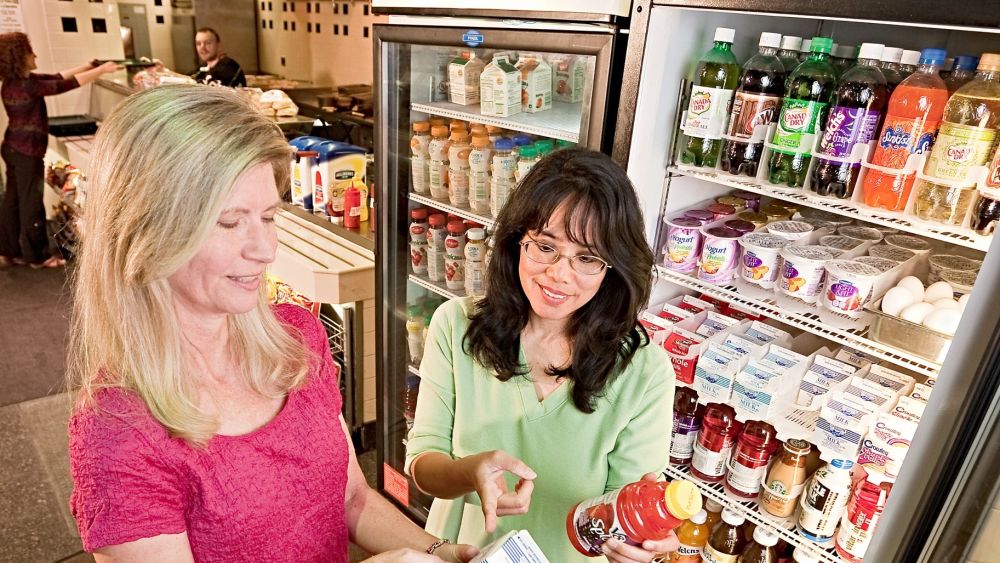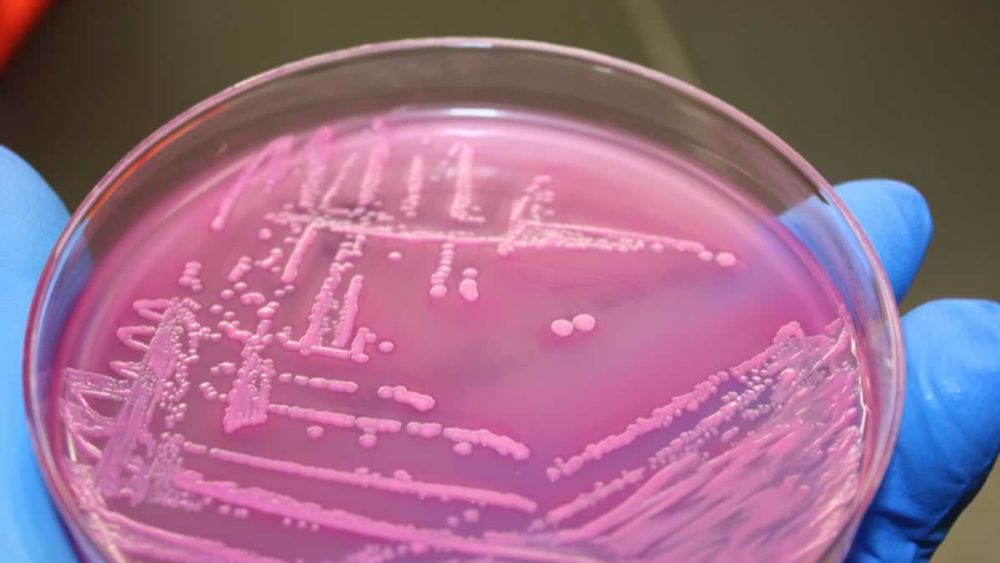Foodborne Illness
Part of the secret of success in life is to eat what you like and let the food fight it out inside – Mark Twain

image by: USDA
HWN Suggests
5 Foods Most Likely to Cause Food Poisoning
If there's one thing we all can agree on, it's that getting food poisoning can be one of the most miserable experiences imaginable. Thankfully, we know which foods are most likely to make you sick, so be extra-careful when you eat these.
Food poisoning can come in many different forms, and there have been some terrible outbreaks over the years. Most of these outbreaks have come from salmonella, which usually occurs when produce isn't properly cleaned, or from E. coli, as a result of eating undercooked animal products. Another major cause of food poisoning is listeria, which can cause miscarriages, and hepatitis A and a whole host of other illnesses can be contracted through food.
Sprouts…
Resources
 How to Minimize the Risk of Food Poisoning
How to Minimize the Risk of Food Poisoning
You can protect yourself up to a point if you take proper precautions with the foods you purchase. Most important: Keep hot foods hot and cold foods cold. If a food is meant to be refrigerated, don’t keep it at temperatures above 40 degrees Fahrenheit any longer than it takes you to get from store to home — an hour or two at most. In hot weather or a sun-drenched vehicle, transport the food in an ice-filled cooler or insulated bag.
 How Gross Is It to Eat Buffet Food?
How Gross Is It to Eat Buffet Food?
Well, an infectious diseases specialist called them "cesspools for bacteria."
 How salad became a major source of food poisoning in the US
How salad became a major source of food poisoning in the US
The latest E. coli outbreak in romaine lettuce is part of a larger trend.
 Pre-cut fruit is being recalled in a salmonella outbreak that has sickened more than 90 people. Here's why a food-poisoning expert refuses to eat it
Pre-cut fruit is being recalled in a salmonella outbreak that has sickened more than 90 people. Here's why a food-poisoning expert refuses to eat it
With more than two decades working as a food poisoning advocate and attorney, there are simply some things that Marler has cut out of his diet. Marler has won more than $600 million for clients in foodborne-illness cases — and become convinced that some foods aren't worth the risk.
 Which leafy greens are healthiest—and which might make you sick?
Which leafy greens are healthiest—and which might make you sick?
Here’s a look at why greens are so vulnerable to contamination, how to avoid getting sick, and whether you can really trust labels that say “triple-washed.”
What Are the Most Common Stomach Bugs Lurking Out There?
With all the news of foodborne illness outbreaks, names like norovirus and E. coli are in the forefront of Americans’ minds. However, many other bugs can cause equally unpleasant — if not worse — gastrointestinal symptoms.
E.Coli Outbreaks - Preventable or a Fact of Life?
Despite advances in medical science, bugs such as E. coli will always be one step ahead of us. Every now and then they will emerge with a vengeance as they spread illness and in extreme cases, death. Always try to find out where your produce comes from and never assume that your food is clean.
Food poisoning: What you need to know
Despite food safety measures, the threat of foodborne illness remains in meat and produce -- and some types of illness are on the rise, recent reports say.
Food-Borne Illnesses: How to Ensure That Your Food is Safe
If you have ever had food poisoning, then you know how terrible the experience can be. Abdominal pain, nausea, diarrhea, fever, chills, vomiting, headache...these are some of the symptoms commonly felt as a result of a food-borne illness. What causes food-borne illnesses? And more importantly, what concrete steps can you take to ensure that your food is safe?
Fruits and vegetables poison more Americans than beef and chicken
According to an estimate from the CDC, produce causes nearly half of all food-borne illnesses, while dairy and eggs cause 20 percent, meat and poultry are the culprits in only 22 percent of cases, and fish and shellfish just 6 percent.
Get More Than Sushi With Your Sushi
Eating sushi can be hazardous, but then again so can eating healthy. Food borne illness is a worldwide problem. Salmonella and E coli are the usual offenders but the notorious norovirus, listeria and hepatitis A are not far behind. In the U.S. the Centers for Disease Control and Prevention (CDC) estimates over 200,000 people are sickened on a daily basis. New York University's Philip Tierno, author of "The Secret Life of Germs" figures the true rate is about 800,000 a day.
Is it Food Poisoning or Something Else?
Here's how to tell if you have the stomach flu or if something you ate is coming back to haunt you.
Keep Food Safe to Eat. Prevent Food Poisoning in Six Steps
Every time your food is handled or moved, there’s a risk of contamination. This is one reason that I like the local-food movement and farmers’ markets. With locally grown food, there are fewer opportunities for mishandling and contamination. What can you do to prevent food poisoning? Take these six precautions to keep your tummy and your family safe.
New Study Reveals Most Common Causes Of Food Poisoning
The research found that from 2008 to 2012, 46 percent of E. coli cases came from beef, 18 percent of salmonella cases came from seeded vegetables and 66 percent of campylobacter cases came from dairy products.
New York City Health Officials Are Using Yelp to Fight Foodborne Illnesses
New York City restaurants have a new reason to fear bad Yelp reviews: The health department is watching.
Salmonella Outbreaks: Who's Watching the Hens?
Salmonella outbreaks will continue to occur despite new regulations aimed at minimizing hen and egg exposure. Stay egg smart. Forego those raw eggs in your next Caesar and don't forget to keep your reuseable bags clean!
The 5 Deadliest Food-Borne Illnesses - and How to Prevent Them
Here, the 5 deadliest types of food-borne bacteria and how to keep yourself and your family members safe...
The Most Common Causes of Food Poisoning (and How to Treat It)
According to the U.S. Department of Health & Human Services, the following organisms cause the most illnesses, hospitalizations, and deaths in the United States...
The Most Common Sources of Food Poisoning
It’s hard to predict where or when an outbreak of one of these illnesses will occur, and of course one shouldn’t live in fear of one’s dinner, but if your stomach starts to cramp and churn between a few hours and a few days after eating one of these foods, it’s possible it was something you ate.
1 In 10 People Around The World Gets Sick From Food Every Year
The most common foodborne ailment and associated burden worldwide is diarrhea caused by norovirus. And its burden — as calculated by number of productive years lost to a disease — in countries in sub-Saharan Africa is about 25 times worse than in countries in North America. Meanwhile, aflatoxin causes decades of productive life to be lost in Africa and Asia, but virtually none in North America.
Foodborne Illness Part 3: How Does Salmonella Make Us Sick?
Question: What do turtles, casino brunches and psychoactive herbs have in common? (Feel free to get creative and imagine a particularly eventful outing for a herpetology enthusiast club.) Answer: all are potential sources of Salmonella infection that have been associated with recent outbreaks in the U.S.. While we mostly think of eggs and poultry products as carriers of Salmonella, pets, livestock, produce, and soil can also spread infection.
 5 Foods Most Likely to Cause Food Poisoning
5 Foods Most Likely to Cause Food Poisoning
If there's one thing we all can agree on, it's that getting food poisoning can be one of the most miserable experiences imaginable. Thankfully, we know which foods are most likely to make you sick, so be extra-careful when you eat these.
6 Things A Food Poisoning Expert Refuses To Eat
As you might imagine, spending a career thinking about the food-borne illnesses that make people sick (or worse) would force a person to think about the kind of meals he puts into his own body.
Fight Bac!
According to public health and food safety experts, each year millions of illnesses in this country can be traced to foodborne bacteria. While the likelihood of serious complications is unknown, the Food and Drug Administration estimates that two to three percent of all foodborne illnesses lead to secondary long-term illnesses.
Food Safety
The history of government regulation of food safety is one of government watchdogs chasing the horse after it's out of the barn - David A. Kessler, M.D. FDA Commissioner.
Foodborne Outbreaks
During a multistate foodborne disease outbreak, CDC serves as lead coordinator between public health partners to detect the outbreak, define its size and extent, and to identify the source.
FoodSafety.gov
When two or more people get the same illness from the same contaminated food or drink, the event is called a foodborne outbreak. Public health officials investigate outbreaks to control them, so more people do not get sick in the outbreak, and to learn how to prevent similar outbreaks from happening in the future.
Iwaspoisoned.com
Iwaspoisoned.com is for people who love to eat out but don’t expect to be ill because of it. It is a consumer led website for diners to report suspected food poisoning or bad food experiences. This real time information is shared by consumers, food authorities, restaurants, and industry with one aim – to make eating a safer experience.
PulseNet
PulseNet compares the 'DNA fingerprints' of bacteria from patients to find clusters of disease that might represent unrecognized outbreaks. Health officials can't stop an outbreak, and industry and regulatory agencies can't make changes to our food and water delivery systems, if they don't know that outbreaks are occurring.
Doctors Lounge
Food borne illness or food poisoning is caused by consuming food contaminated with pathogenic bacteria, toxins, viruses, prions or parasites. Such contamination usually arises from improper handling, preparation or storage of food.
eMedicineHealth
Food poisoning is a common, usually mild, but sometimes deadly illness. Typical symptoms include nausea, vomiting, abdominal cramping, and diarrhea that come on suddenly (within 48 hours) of consuming a contaminated food or drink.
MedicineNet
Site covering the common causes of food poisoning.
MedlinePlus
Comprehensive site covering food poisoning.

Introducing Stitches!
Your Path to Meaningful Connections in the World of Health and Medicine
Connect, Collaborate, and Engage!
Coming Soon - Stitches, the innovative chat app from the creators of HWN. Join meaningful conversations on health and medical topics. Share text, images, and videos seamlessly. Connect directly within HWN's topic pages and articles.
















